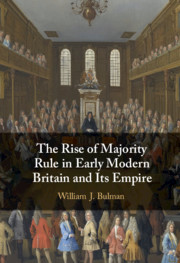Book contents
- The Rise of Majority Rule in Early Modern Britain and Its Empire
- The Rise of Majority Rule in Early Modern Britain and Its Empire
- Copyright page
- Dedication
- Contents
- Figures
- Tables
- Acknowledgments
- Note on the Text
- Abbreviations
- 1 Introduction
- 2 Consensus in the Commons, 1547–1642
- 3 Consensus Imperiled, 1640–1641
- 4 Consensus Destroyed, 1641–1643
- 5 Revolutionary Decisions, 1643–1660
- 6 The Majority Institutionalized, 1660–1800
- 7 Little Parliaments in the Atlantic Colonies, 1613–1789
- 8 Conclusion
- Bibliography
- Index
4 - Consensus Destroyed, 1641–1643
Published online by Cambridge University Press: 22 March 2021
- The Rise of Majority Rule in Early Modern Britain and Its Empire
- The Rise of Majority Rule in Early Modern Britain and Its Empire
- Copyright page
- Dedication
- Contents
- Figures
- Tables
- Acknowledgments
- Note on the Text
- Abbreviations
- 1 Introduction
- 2 Consensus in the Commons, 1547–1642
- 3 Consensus Imperiled, 1640–1641
- 4 Consensus Destroyed, 1641–1643
- 5 Revolutionary Decisions, 1643–1660
- 6 The Majority Institutionalized, 1660–1800
- 7 Little Parliaments in the Atlantic Colonies, 1613–1789
- 8 Conclusion
- Bibliography
- Index
Summary
This chapter describes and explains the fitful emergence of majoritarian political tactics in late 1641 and 1642 and the crucial turn toward consistently majoritarian decision-making between December 1642 and April 1643. It demonstrates how the House of Commons was unable to maintain its consensual decision-making practices once its members found themselves struggling over how to approach the early stages of the Civil War and their first peace negotiations with Charles I. Under these conditions of structural dislocation, members’ use of majoritarian tactics proliferated. Members who employed these tactics at the time clearly considered them to be emergency measures that enabled them to engage in effective status interaction under extremely trying circumstances. Neither these tactics nor majoritarian decision-making itself had yet become institutionalized. The 1641 controversy over protestations to the printing of the Grand Remonstrance vividly exposed the strains under which the Commons was struggling to continue to function. But the winter of 1642–3 was the clear turning point: consensual decision-making suddenly collapsed amid the emergence of war and peace groupings in Parliament and an array of other remarkable developments in English political culture between 1641 and 1643.
Keywords
- Type
- Chapter
- Information
- Publisher: Cambridge University PressPrint publication year: 2021

